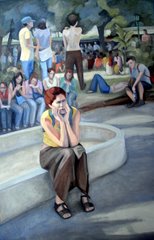aI´ve sent these journal entries to students who have participated in my study abroad programs, selected students of Spanish, the L2 adjuncts, LAR, and the Latino profs at SPSU. A couple of the students responded to the request for comments and questions. Here they are:
from Aleksey..
Very interesting read. The only question I can come up with right now concerns tu. You said that it's not really used, but I'm sure they know about it. What my question is, is if using tu would be considered offensive for being too informal or something. I know tu is used for nearly everything in Caribbean cultures (at least in Puerto Rico) so I was just wondering about its use.
Also, I liked the comment about not yet having seen the explosiveness in speech like Caribbean cultures have. :)
Sure, they know that in other countries tú is the norm for familiar singular. Both tú and vos are familiar singular, and no, there wouldn´t be any offense taken when tú is used. It is just a regional difference. You liked my comment about el Caribe because you´re a Boricua, as if you didn´t know!
From Jason…
Hi Profe,
Wonderful journal entries so far--thanks! I'm curious about the local print news media you see in the kiosks. How many competing newspapers (large and small) are there? Is there a wide range of ideological slants reflected in the daily/weekly press? I imagine that there is at least one Italian-language local paper in the kiosks (there is one, maybe two published in Caracas)--what about other languages in locally published media?
Another thing I'm curious about is how crowded the streets and sidewalks are. When I first started walking around in Caracas, people kept stepping on my shoes, from walking so close together.
The local print media is a vast array of publications. The political positions range from conservative to the opposition. I don´t know the number of local publications, but there are many. Surprisingly, I haven´t run across Corriere de la Sera yet, but I imagine it´s around here, given the number of Argentines with dual Arg-Italy citizenship. RAI is carried on cable TV, so that should be an indication of what is in print..
Yes, the sidewalks are crowded. Rich and I have to walk single file on narrow sidewalks. Maybe that´s why I haven´t seen women out together walking arm-in-arm, nor men, for that matter--–not even on wide sidewalks, come to think of it…You see that a lot in Spain. Proxemics, as you know, are different for Latinos. Anglos are very uncomfortable with the closeness and touching. Perhaps that´s why Argentine tango dancing looks like an A, while American so-called tango dancing looks like a V!
A challenge: read the lyrics and their explanation—because of the amount of Lunfardo:
http://www.terapiatanguera.com.ar/Grandes%20Tangos/YiraYira.htm
Then, listen and watch this video: http://www.youtube.com/watch?v=bDZnYpHVNMo
Btw, Lunfardo is defined here: http://es.wikipedia.org/wiki/Lunfardo
We spoke today for quite a while with a former reporter from the Washington Post, and also an ex-pat military and Episcopal priest. He has been here for a few years and recently retired. His take on the Argentina political situation is the opposite of the interviewee from yesterday. Rich suspects that yesterday´s person is CIA. I think they both are. Oooooo, spooks! I had hoped that he would bring his bride today because she is an educator, but it didn´t happen. He DID, however, give me the names of 2 professors in the School of Arts and Sciences. It turns out that each School has it´s own language program, so that the contact info sent to me by the UBA Engineering Faculty was for THEIR school only. There are others.
News today is about the last of the officials of the military dictatorship being let go. They had been implicated in the disappearance of all those students and other young people who were herded into planes and dumped in the Atlantic. If you want to see an interesting film about that period of time in Argentina, check out Historia official (Official history/story).
Smells on the streets: diesel exhaust, cigarette smoke (not many no smoking areas here), and perfume, worn by both sexes—lots of it. Sounds—swallows, some car horns, some Vespas going by, and not as many loud voices as in Spain.
More later.
14.12.07
Subscribe to:
Post Comments (Atom)


1 comment:
Took me time to read the whole article, the article is great but the comments bring more brainstorm ideas, thanks.
- Johnson
Post a Comment